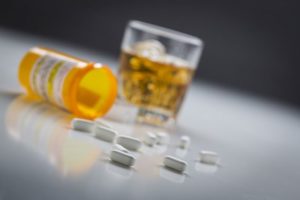Vicodin was once one of the most popular prescription painkillers on the market, typically prescribed to treat moderate-to-severe pain that was expected to heal with time. This drug is the most familiar of several brand name and generic combinations of the opioid painkiller, hydrocodone, and the nonsteroidal anti-inflammatory drug (NSAID), acetaminophen.
When taken as directed, hydrocodone and acetaminophen medications like Vicodin are highly effective for relieving pain. However, it is important to follow the prescription and quit the medication when it is time to quit. For many people, stopping Vicodin consumption is difficult, and they end up struggling with opioid addiction.
There is a risk of mixing Vicodin and other substances, which includes other opioid painkillers and other sedatives. This includes barbiturates, benzodiazepines like Xanax or Valium, and alcohol. According to the National Institute on Alcohol Abuse and Alcoholism (NIAAA), in 2015, 86.4 percent of people age 18 and older in the United States stated they had drank alcohol at least once in their lives; about 56 percent reported they drank at least once in the past month. About 15.1 million adults, and 630,000 adolescents between the ages of 12 and 17, struggle with alcohol use disorder (AUD), the clinical term for alcoholism.
With so many people in the U.S. consuming alcohol and so many people receiving painkiller prescriptions for medications like Vicodin, there likely will be overlap among people who take their pain medications as prescribed and drink a moderate amount of alcohol socially. Even this practice can be dangerous and lead to an overdose, but an overdose on multiple substances will more likely occur in people who abuse opioids and alcohol together.
What Happens When Vicodin and Alcohol Are Mixed?
Mixing Vicodin and alcohol is so dangerous, in fact, that doctors warn their patients against it, and prescription bottles of hydrocodone combination products include a warning against mixing these two sedative drugs. This is because alcohol can compound the effects of hydrocodone while increasing the liver damage caused by acetaminophen.
Narcotics and Alcohol: A Dangerous Combination
A study on the effects of mixing opioids and alcohol found that respiratory depression, in particular, was extremely likely. While the study focused on oxycodone rather than hydrocodone, both opioids have similar levels of potency.
In the study, volunteers were supervised in a clinical setting, and given one 20 mg (milligrams) oxycodone pill, along with different amounts of intravenous ethanol, to simulate getting drunk. The amount of ethanol was increased during each visit from a placebo to the equivalent of one drink for women and three drinks for men.
Finally, it was increased to the equivalent of three drinks for women and five drinks for men. One oxycodone tablet by itself reduced baseline breathing by about 28 percent; adding a small amount of ethanol increased that by another 19 percent, leading to about 47 percent reduced ventilation. Reducing breathing by this much can have severe side effects.
People who drink alcohol while taking any hydrocodone product may experience various effects, including:
- Memory loss
- Confusion
- Passing out
- Respiratory depression
- Reduced blood pressure and heart rate
Both alcohol and Vicodin are known to upset the stomach, which may lead to nausea and vomiting. Without proper recommendations from a doctor to ease this symptom when taking Vicodin, you could suffer dehydration, which may lead to additional harmful side effects.
Drinking alcohol and taking an opioid drug like Vicodin increases the feeling of intoxication and relaxation because both these substances cause these euphoric effects. This combination increases the risk of becoming addicted to either or both drugs, which leads to the compulsive abuse of both substances, and it can rapidly lead to an overdose and death.
Liver Damage
Many people likely have combined an over-the-counter acetaminophen drug, like Tylenol or a cold and sinus treatment, with alcohol at some point in their lives. Few people consider the potential dangers of mixing these two substances, however.
While accidentally mixing them once or twice in a lifetime will not likely cause serious problems, consistently abusing drugs that contain acetaminophen, such as Vicodin, with drinking heavily or binge drinking greatly increases the risk of acute liver failure.
For many years, acetaminophen by itself was presumed safe. However, after the NSAID was added to dozens of OTC products, it was found that taking too much in one day could lead to an overdose. The specific amount is 4000 mg, or 4 grams, of acetaminophen. This causes acute liver failure and requires hospitalization.

Medical researchers also found that consistently taking 325 mg or more of acetaminophen in a day can cause damage to the liver at similar levels as drinking heavily. Alcohol has long been known to damage the liver even in moderate amounts for some people. Abusing alcohol and Vicodin at the same time is very likely to lead to an overdose that involves extensive liver damage. The more acetaminophen you consume, the more you damage your liver; this is the same for alcohol, which will compound liver damage from the NSAID.
Consuming too much alcohol and too much acetaminophen have both, separately, been correlated with an increased risk of kidney damage.
Distinct Signs Of Acute Liver Failure Are:
- Jaundice, or yellowing of the whites of the eyes or the skin
- Pain in the upper right side of the abdomen
- Abdominal swelling
- Nausea and vomiting
- Malaise, or generally feeling unwell
- Confusion and disorientation
- Fatigue
With acute liver failure, these symptoms can occur within a few days.
No Safe Amount of Alcohol and Vicodin
If you have been prescribed Vicodin for medical treatment, avoid alcohol while you take this medication. There is no amount of alcohol consumption that is safe if one is taking prescription opioid painkillers or drugs with acetaminophen. If you struggle with Vicodin and alcohol abuse, you can get help through evidence-based treatment programs.